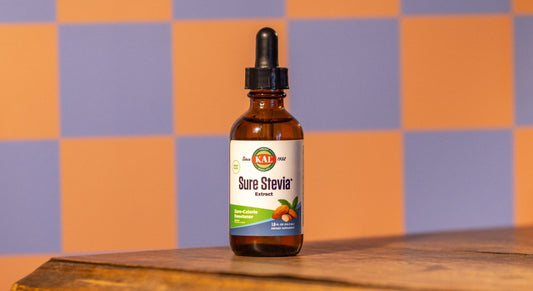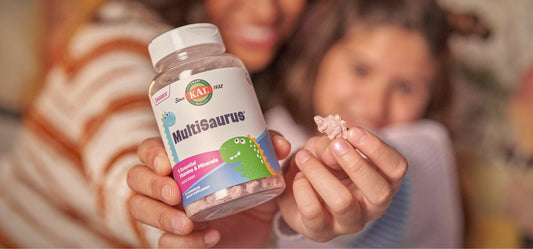NOTE: This article is part of our Mineral Guide Series, your go-to resource for essential insights on minerals like magnesium, electrolytes and more.
When it comes to essential nutrients, zinc may come last in the alphabet—but it’s among the first in importance to our daily wellness.
Zinc has been called “the immunity mineral”—and there’s a reason for that.* As part of our Mineral Guide Series, we’ll dive into why that is, what zinc is, how to get it and what it can do for you and your health.
90 Years of Mineral Expertise
Fun fact: KAL was the first company to bring mineral supplements to market back in 1932. Nearly a century later, we’re still leading the way in products that harness the power of minerals. (They’re kind of our thing.)
But enough about us. Let’s talk about what zinc can do for you—and why your body counts on it every single day.
What is Zinc?
Simply put: Zinc is a trace mineral, represented by the symbol Zn on the periodic table. It’s bluish-white in color and it plays structural, catalytic, and regulatory roles in biology, industry, and the environment.
In our bodies, zinc acts as a regulatory “gatekeeper” of the immune system, controlling signaling, function, and balance within immune cells.1
What are the Benefits of Zinc?
Zinc powers your daily performance, and when your levels are on point, your whole body feels the difference. Here are just a few ways it supports your system:
Immunity
First and foremost, Zinc is essential to our immune function. Zinc ions are involved in regulating intracellular signaling pathways in both innate and adaptive immune cells. Zinc homeostasis, the body’s ability to maintain balanced zinc levels, is known to be an important in immunological reactions.1
This is why zinc is often found in immune health supplements, even added to formulas of other traditional immunity support like zinc with elderberry and zinc with vitamin C.*
Cellular function
Zinc is involved in many cellular processes, including how your cells grow, divide, and repair themselves. It acts like a helper for enzymes and proteins that your body uses every day to build and protect tissues.2
Skin health
Zinc benefits for skin are well-known. It helps support immune responses in the skin, and plays a role in collagen production, which keeps skin strong and smooth.2
Taste acuity
Zinc is needed for special proteins in your taste buds and nasal cells to work properly. If your body is low on zinc, you might notice food tastes “off” or your sense of smell changes. It’s one of the reasons people with low zinc sometimes lose their appetite.* 3
Zinc has also been shown to support bone health, male reproductive health, PMS, prostate health, heart health (when paired with copper), and muscle health.*
What Foods Have Zinc?
Unlike some vitamins and minerals that are stored in fat or the liver, zinc doesn’t stick around in the body.2 That means you need to get a small, steady supply from food or supplements every day to keep your levels where they should be.
The strongest dietary source of zinc is meat. Oysters have the highest zinc levels of all foods with up to 32 mg per 3 oz. serving. However, in American diets, beef contributes to 20% of overall zinc intake since it contains higher levels than other commonly accessible meats. Other zinc-rich meats include:
- Blue crab
- Pork chops
- Lobster
- Chicken (particularly dark meat)
While zinc levels are typically higher in meat-based foods, plant-based options like beans and legumes can still offer beneficial amounts of this essential mineral. Zinc-rich plant options include:
- Navy beans (commonly found in baked beans)
- Cooked chickpeas
- Roasted pumpkin seeds
- Dry roasted cashews
Many fortified breakfast cereals may also provide a solid dose of zinc.3
What is the Daily Recommended Intake of Zinc?
Adult men and pregnant women should aim for at least 11 mg of zinc a day, which is about the same as 9 oz. of beef or blue crab.3
Unfortunately, due to modern food production factors like soil nutrient depletion and over-processing, whole foods may not offer as many nutrients as they once did. Not to mention, we don’t always eat a varied, balanced diet all of the time. It’s important to be proactive in making up the difference. That’s where supplementation comes in.
Who Should Take Zinc Supplements?
Anyone looking to give their body added support for immune health, as well as cellular function, skin health, and bone health may benefit from adding zinc supplements to their daily intake.* Since meat has higher levels of zinc than plant-based foods, supplementation can be particularly helpful for vegans and vegetarians.1,3
But the type of zinc you take matters. If your supplement is low-quality, zinc homeostasis can be more difficult for your body to achieve.
What are the Best Zinc Supplements?
The best zinc supplement is the one your body will use—which means absorbability and bioavailability are key.
KAL Liposomal Zinc delivers a proper dose of zinc: 30 mg, which is enough to earn key benefits. But it also uses liposomal technology to keep the nutrient intact until it reaches the large intestine, where it breaks down and absorbs into the body. This helps with both gentle digestion and bioavailability so you get more of the mineral you need.*
Chelated Magnesium, like other products that use chelated minerals, also has a leg up on bioavailability due to the process of chelation, where a mineral is bonded to an organic molecule to help your body better recognize and absorb it.*
For people who don’t like swallowing capsules, Zinc ActivMelts provide a gentle 5 mg dose of zinc and dissolves in your mouth—no chewing required.
Zinc 30 Orotate delivers a strong 30 mg of zinc in a sustained-release tablet, which gives your body more time throughout the day to absorb the nutrient.
Mineral Magnitude
To summarize, why take zinc supplements? Three key reasons:
- Zinc plays a critical role in our body’s immune health.* 1
- Zinc helps enzymes and proteins support cellular function.* 2
- Whether you’re an adult or child, and whether you prefer classic capsules or dissolvable chewables, there’s a zinc supplement for you.
Essential minerals are part of us. And, at KAL, part of our history. When we focus on the key elements of health provided to us by Mother Nature, we foster lasting wellness and daily joy. That’s why we prioritize zinc in our line of quality supplements—and why it’s our go-to mineral for immunity support.
For more tips on nutrition, mindful wellness practices, and how to fuel good feelings for the long run, follow us on Instagram at @kalvitamins!
*These statements have not been evaluated by the Food and Drug Administration. These products are not intended to diagnose, treat, cure or prevent any disease.
Resources
- Wessels, I. et al. “Zinc as a gatekeeper of Immune Function.” Nutrients. National Institute of Health, https://pmc.ncbi.nlm.nih.gov/articles/PMC5748737/.
- Roohani, N. et al. “Zinc and its importance for human health: an Integrative review.” J Res Med Sci, 2013. National Institute of Health, https://pmc.ncbi.nlm.nih.gov/articles/PMC3724376/.
- “Zinc: Fact Sheet for Professionals.” Strengthening Knowledge and Understanding of Dietary Supplements. Office of Dietary Supplements, National Institutes of Health. https://ods.od.nih.gov/factsheets/Zinc-HealthProfessional/.




